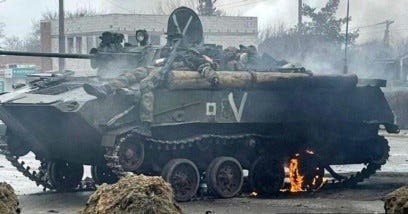An extraordinary new statistic was released yesterday. The Pentagon now estimates that more than 7,000 Russian soldiers have been killed in the three weeks since the start of its war against Ukraine. It is a conservative estimate, arrived at by analyzing video footage and satellite photos and taking in Ukrainian estimates of Russian casualties, which the Pentagon feels are high at 13,500, and Russian reports of its own casualties of 498, now more than two weeks old. American experts can estimate deaths by counting the number of Russian tanks, armored personnel carriers and trucks that have been destroyed. They know the number of soldiers carried in each type of vehicle, and by multiplying the numbers, come up with a total that way. Seven thousand deaths is more than the U.S. suffered in Iraq and Afghanistan combined over more than a decade of war.
The number of Russian wounded and injured is estimated to be between 14,000 and 21,000. Using low estimates of Russia’s casualties, the Pentagon has concluded that more than 10 percent of Russian forces in Ukraine have been killed or sidelined in the fighting. When military units suffer casualties that are greater than 10 percent, their combat effectiveness is severely hampered. There was a report on MSNBC this morning that a Russian armored battalion tactical group was taken out in fighting in Vosnesensk in the south of Ukraine earlier in the war. Casualties and equipment losses were so high, the battalion was relieved of combat duty and had to be replaced entirely.
The New York Times reported this morning that “senior Biden officials” are receiving reports every day of Russian soldiers “just parking their vehicles and walking off into the woods.” When you combine casualty figures with reports of what amounts to desertion under fire, the Russian army now fighting in Ukraine is having some real problems on the battlefield, which probably accounts for their units being unable to encircle and take major cities like Kharkiv and Kyiv.
Putin is increasingly relying on his air force to bomb the cities because “Russian ground forces are in disarray,” the Times reported. The strike on the theater sheltering as many as 1,000 civilians in Mariupol yesterday was carried out by a Russian warplane, and I’ve seen other examples of aerial bombardment in Mariupol, Kharkiv, and Kyiv. The bombs leave huge craters, much bigger than those left by artillery shells or ground-launched rockets.
As Russian ground forces continue to shell major cities with artillery and rockets, I have looked in vain for any sort of pattern to the bombardment. Other than the fact that nearly all targets hit are civilian, I really can’t see any. Video footage from Ukraine shows artillery damage to apartment buildings, such as one or two apartments on an upper floor hit by shells and heavily damaged or burning. But in the same shot, you can see other buildings nearby that are untouched. And I haven’t seen any footage yet of whole blocks leveled by artillery and rocket bombardment.
It’s possible, using a combination of 155 mm artillery batteries and multiple rocket launchers to really devastate whole neighborhoods of cities, and by that, I mean reduce blocks of apartments or houses to rubble that is only a few feet tall. I haven’t seen any evidence of this sort of well-organized bombardment of Ukrainian cities. Instead, what I’m seeing in footage from Ukraine is random damage here and there. I’ve seen some apartment buildings that were fairly hard hit and burned, but they are still standing, but I’ve seen even more footage of apartment buildings that have all their windows blown out without any structural damage. Videos taken inside show damage to individual apartments, but it’s not the kind of total damage that can’t be repaired, and it is definitely not what the Russians did to Aleppo or Grozny. Those cities were leveled by Russian airpower and artillery. Whole sections of both cities had no buildings left standing.
Which raises a peculiar question for which I have as yet no answer. What are the Russian artillery units doing? It’s almost as if individual 155 mm howitzers are being fired and individual rocket launcher pods are expended, and the warheads land here and there doing damage to civilian buildings and streets, but there is no real pattern to it. An artillery battery has six to eight howitzers or the same number of rocket launchers. If you take the numbers I’ve seen in satellite photographs of convoys, the Russians could be combining multiple batteries and firing barrages that would reduce Ukrainian cities to waist-high rubble.
But they’re obviously not. Is it because they don’t have enough ammunition? They haven’t been able to move their batteries close enough except around Mariupol and maybe on two sides of Kharkiv. Is it because the Russian soldiers just aren’t motivated enough to be pulling their lanyards in unison, knowing they will be killing hundreds if not thousands of Ukrainians, who after all, are a Slavic people just like them who have lived peacefully next door to Russia for decades?
The Pentagon is starting to make quite a big deal about the Russian army’s breakdown in “unit cohesion and morale,” which is mil-speak for fighting spirit. Four Russian generals have been killed in the fighting in three weeks, an extraordinary number when you consider there have been only about 20 generals total in command of Russian forces in Ukraine. To lose nearly a quarter of your senior command structure is, to put it bluntly, not a good thing at all. The Times said that two American military officials reported that Russian generals have been using “unsecured phones and radios” to communicate. In one instance, the Ukrainians intercepted a Russian general’s phone call and triangulated his position and killed him and his staff, which indicates that they hit his position with an artillery barrage.
You don’t have to be a military expert to know that it’s never a good sign when your senior army commanders are forced by the poor performance of their own units to be so close to the front lines that 25 percent of them are killed in the fighting. Maybe knowing Putin’s professed admiration of Stalin, they are remembering his purge of colonels and generals when 46 senior Soviet army commanders, including 17 generals, were summarily executed without trial on a single day in February of 1942 because of their lack of performance against the German army on the battlefield.
Meanwhile, back in Moscow, Putin is reported to have arrested two of Russia’s top intelligence officials in the FSB, the replacement for the KGB, and interrogated them about why they had provided such poor intelligence prior to the invasion. They appear to have been among the senior officials in the Kremlin who told Putin his army would have no trouble taking Kyiv, and his soldiers would be greeted by happy Ukrainians as liberators. Shades of Paul Wolfowitz, the deputy secretary of defense who told a congressional committee almost exactly that before the invasion of Iraq in 2003 – as well as assuring them that they shouldn’t worry about costs, because “the war will pay for itself.”
With four trillion dollars down the drain, wouldn’t it be nice to arrest Wolfowitz and interrogate him about why he delivered such rosy projections before we got our asses whipped in Iraq?
Russian military morale is plummeting, combat losses are going up, ground units are stalled around every major city, and resupply convoys are under constant attack by teams of Ukrainian raiders and military experts are wondering what Putin is going to do about it. The consensus in Washington seems to be that he will continue to throw soldiers down the combat rathole Ukraine has turned into for him.
Putin has already committed 60 percent of the Russian army to the fighting in Ukraine, and his battlefield losses are so high that he’s scrambling around trying to hire Syrians and other mercenaries to fight for him. How long can he keep it up?




Really good reporting, Lucian. Very very nice.
“How long can he keep it up?”
A few weeks? A month? I think this invasion is going to go in the toilet pretty soon, probably in April. When you have soldiers who have not been properly informed about what they’re doing, but who have been clearly informed that they will be arrested, court-martialed, or shot if they return, you have a recipe for disaster in the morale department. Add to this recipe the fact that Russians are suddenly finding out that they are fighting Ukraine, which would be like soldiers from New York suddenly finding out that they are attacking and invading New Jersey. It’s a complete fiasco in every respect except for the deaths and injuries and despair it’s causing. Emulating Stalin, but choosing all the top people in the Kremlin instead, would be a fitting end to this criminal tragedy of world-class proportions.
Given this debacle, do you feel Putin is strong enough to stay in power - and who could depose him? Outside perhaps his inner circle, dissent must be brewing.